Você já se perguntou como navegar na internet como um local de qualquer lugar do mundo ou como permanecer anônimo enquanto coleta dados online? Os proxies residenciais podem ser a solução que você está procurando. Mas o que exatamente são proxies residenciais e por que eles são tão valiosos?
Esses proxies fornecem um endereço IP exclusivo de provedores de serviços de Internet (ISPs) reais, fazendo com que pareçam usuários comuns. Esteja você procurando acessar conteúdo com restrição geográfica, realizar web scraping seguro ou aprimorar a privacidade online, entender os proxies residenciais é crucial. Vamos mergulhar no que são proxies residenciais e por que eles são essenciais para o uso seguro e eficiente da Internet.
O que são proxies residenciais e como eles funcionam?
Proxies residenciaissão um tipo de servidor proxy que usa endereços IP fornecidos por provedores de serviços de Internet (ISPs) reais. Ao contrário dos proxies de datacenter, que usam endereços IP gerados por servidores em nuvem, os proxies residenciais estão vinculados a um local físico e a um dispositivo real.
Isso faz com que pareçam pertencer a um usuário comum da Internet, o que ajuda a evitar a detecção e o bloqueio por sites. Os proxies residenciais são altamente valiosos para atividades que exigem altos níveis de anonimato e autenticidade, como web scraping, acesso a conteúdo com restrição geográfica e gerenciamento de várias contas de mídia social.
Principais funções dos proxies residenciais
Acesso a conteúdo com restrição geográfica:
Os proxies residenciais são comumente usados para acessar conteúdo restrito com base na localização geográfica. Por exemplo, serviços de streaming, sites de notícias e outras plataformas online geralmente restringem o acesso a determinadas regiões. Ao usar um proxy residencial de um país específico, os usuários podem acessar o conteúdo como se estivessem navegando a partir desse local.
Web Scraping e coleta de dados:
As empresas costumam usar proxies residenciais para web scraping e coleta de dados. Como esses proxies aparecem como usuários reais, é menos provável que sejam detectados e bloqueados por sites que implementam medidas anti-scraping. Isso permite que as empresas coletem dados valiosos para pesquisa de mercado, análise de preços e outros fins de inteligência competitiva.
Gerenciando várias contas:
Os proxies residenciais são essenciais para gerenciar várias contas de mídia social ou comércio eletrônico sem serem sinalizados ou banidos. Os sites geralmente monitoram endereços IP para evitar a criação de várias contas. Ao usar diferentes proxies residenciais para cada conta, os usuários podem imitar usuários reais e diversos e evitar a detecção.
Privacidade e segurança aprimoradas:
Os proxies residenciais ajudam a manter o anonimato e a privacidade do usuário, mascarando o endereço IP real do usuário. Ao navegar com um proxy residencial, o endereço IP real do usuário fica oculto e o endereço IP do proxy é mostrado. Isso é particularmente útil para evitar rastreamento, vigilância e coleta de dados indesejados por sites e terceiros.
Como os proxies residenciais mantêm você anônimo
Os proxies residenciais aprimoram seu anonimato online empregando várias estratégias que funcionam juntas perfeitamente:
Mascarando seu endereço IP real:
Quando você navega na Internet usando um proxy residencial, o tráfego da Web é roteado pelo endereço IP do servidor proxy. Como resultado, os sites que você visita veem apenas o endereço IP do proxy, e não o seu. Isso oculta efetivamente sua localização e identidade reais, fazendo parecer que você está navegando de um lugar completamente diferente.
Endereços IP rotativos:
Para fortalecer ainda mais o anonimato, muitos serviços de proxy residencial fornecem endereços IP rotativos. Com esse recurso, seu endereço IP de proxy muda periodicamente ou a cada nova solicitação. Essa mudança constante impede que os sites reconheçam padrões em sua atividade, tornando muito mais difícil para eles rastrear seu comportamento online ou sinalizar suas ações como suspeitas.
Ao combinar esses métodos - mascarando seu endereço IP real e endereços IP rotativos - os proxies residenciais garantem que sua presença online permaneça oculta, proporcionando uma experiência de navegação segura e privada.
Ao entender o que são proxies residenciais e como eles funcionam, os usuários podem aproveitar seus recursos para navegar na Internet com mais segurança, acessar conteúdo restrito e executar várias tarefas online, mantendo um alto nível de anonimato.
Diferenças entre proxies residenciais e outros tipos de proxies
Proxies residenciais vs. proxies de datacenter:
- Fonte de endereços IP: Os proxies residenciais usam IPs fornecidos por ISPs, enquanto os proxies de datacenter usam IPs gerados por data centers, que não estão associados a um local físico. Isso torna os proxies de datacenter mais fáceis de detectar e bloquear por sites com medidas de segurança robustas.
- Anonimato: os proxies residenciais oferecem maior anonimato porque seus endereços IP imitam a atividade real do usuário, enquanto os proxies de datacenter são frequentemente sinalizados como tráfego suspeito ou automatizado.
- Custo: os proxies residenciais tendem a ser mais caros do que os proxies de datacenter devido à sua confiabilidade, autenticidade e natureza mais difícil de bloquear.
Proxies residenciais vs. proxies móveis:
- Fonte de endereços IP: Os proxies móveis usam IPs fornecidos por operadoras de rede móvel e estão associados a dispositivos móveis. Assim como os proxies residenciais, os proxies móveis também oferecem alto anonimato, mas são mais dinâmicos devido à natureza da alocação de IP da rede móvel.
- Casos de uso: os proxies residenciais geralmente são preferidos para atividades como web scraping, verificação de anúncios e gerenciamento de várias contas. Por outro lado, os proxies móveis são mais adequados para tarefas que exigem níveis extremamente altos de confiança e legitimidade, como automação de mídia social ou acesso a conteúdo específico para dispositivos móveis.
- Disponibilidade e custo: Os proxies móveis geralmente estão menos disponíveis e são mais caros em comparação com os proxies residenciais, pois fornecem um nível ainda mais alto de anonimato.
Proxies residenciais vs. proxies públicos:
- Confiabilidade: Os proxies públicos são gratuitos e acessíveis a todos, tornando-os altamente não confiáveis e muitas vezes lentos. Por outro lado, os proxies residenciais são mais estáveis e oferecem desempenho consistente porque são privados e fornecidos por ISPs legítimos.
- Segurança: os proxies públicos carecem de recursos de segurança e podem expor os usuários a riscos como violações de dados e malware. Os proxies residenciais, por outro lado, oferecem melhor segurança e privacidade, tornando-os uma opção mais segura para atividades online confidenciais.
O que considerar ao comprar proxies residenciais
A compra de proxies residenciais pode ser uma decisão crucial, especialmente se você precisar deles para tarefas como web scraping, gerenciamento de várias contas ou acesso a conteúdo com restrição geográfica. Os proxies residenciais são conhecidos por seu alto anonimato e eficácia, mas nem todos os provedores oferecem o mesmo nível de serviço. Aqui estão alguns fatores-chave a serem considerados ao comprar proxies residenciais para garantir que você obtenha o melhor valor e desempenho:
1.Reputação e confiabilidade do provedor
- Reputação: Procure um provedor de proxy com forte reputação no mercado. Leia as avaliações dos usuários, verifique depoimentos e busque recomendações de fontes confiáveis para garantir que o provedor seja confiável e confiável.
- Tempo de atividade e confiabilidade: Um bom provedor de proxy residencial deve oferecer alto tempo de atividade (idealmente 99.9%) e desempenho consistente sem tempo de inatividade frequente. Proxies confiáveis garantem acesso suave e ininterrupto a sites e serviços.
2.Tamanho e diversidade do pool de IPs
- Grande pool de IP: O tamanho do pool de IP é um fator crítico ao escolher um provedor de proxy residencial. Um grande conjunto de endereços IP reduz as chances de reutilização e detecção de IP por sites, tornando suas atividades mais seguras e menos propensas a serem bloqueadas.
- Diversidade geográfica: Se você precisar de proxies de locais específicos, certifique-se de que o provedor ofereça uma variedade diversificada de endereços IP de diferentes países e cidades. Essa flexibilidade é essencial para tarefas como web scraping localizado, verificação de anúncios e pesquisa de mercado.
3.Preços e opções de pagamento
- Estrutura de preços: Diferentes provedores oferecem modelos de preços variados - alguns cobram por IP, enquanto outros cobram por GB de dados usados. Entenda qual modelo de precificação melhor atende às suas necessidades. Por exemplo, se você precisar de proxies para tarefas com muitos dados, um provedor com uma taxa acessível por GB pode ser mais adequado.
- Transparência: Certifique-se de que o provedor ofereça preços transparentes sem taxas ocultas. Procure períodos de teste ou garantias de devolução do dinheiro para testar o serviço antes de se comprometer com um plano de longo prazo.
- Opções de pagamento: escolha um provedor que ofereça suporte a várias opções de pagamento, como cartões de crédito, PayPal, criptomoeda e outros métodos seguros, para flexibilidade e conveniência.
4.Recursos e opções de personalização
- Proxies rotativos vs. estáticos: Determine se você precisa de proxies rotativos (que alteram os endereços IP periodicamente ou por solicitação) ou proxies estáticos (que mantêm o mesmo endereço IP por um determinado período). Os proxies rotativos são ideais para web scraping e verificação de anúncios, enquanto os proxies estáticos são melhores para gerenciar contas.
- Controle de sessão: Procure provedores que ofereçam recursos de controle de sessão, como sessões fixas, em que o IP permanece o mesmo por um determinado período. Isso é útil para manter a consistência da sessão sem disparar alarmes de segurança em sites.
5.Velocidade e desempenho
- Velocidade do proxy: A velocidade é crucial, especialmente para tarefas como streaming, jogos ou web scraping. Proxies lentos podem levar a tempos limite e atrasos. Escolha um provedor que garanta proxies de alta velocidade e ofereça testes de velocidade ou opções de teste para avaliar o desempenho.
- Limitações de largura de banda: Verifique se há alguma limitação ou limite de largura de banda. As opções de largura de banda ilimitada são ideais para tarefas com uso intensivo de dados, mas alguns provedores podem oferecer preços diferenciados com base no uso de dados. Certifique-se de que o plano escolhido esteja alinhado com suas necessidades.
6.Segurança e privacidade
- Política de não registro: Certifique-se de que o provedor tenha uma política rígida de não registro, o que significa que eles não armazenam sua atividade ou dados de navegação. Isso é crucial para manter a privacidade e evitar vazamentos de dados.
- Criptografia e autenticação: procure proxies que ofereçam conexões HTTPS seguras e métodos de autenticação adequados (lista de permissões de IP ou autenticação de usuário) para aumentar a segurança e impedir o acesso não autorizado.
7.Suporte ao cliente e nível de serviço
- Suporte 24 horas por dia, 7 dias por semana: O suporte confiável ao cliente é essencial, especialmente se você encontrar problemas com seus proxies. Escolha um provedor que ofereça suporte ao cliente 24 horas por dia, 7 dias por semana, por meio de vários canais, como chat ao vivo, e-mail ou telefone.
- Base de conhecimento e documentação: Uma base de conhecimento abrangente, guias e tutoriais podem ser recursos valiosos para configurar e solucionar problemas de proxies. Certifique-se de que o provedor ofereça documentação adequada para seus serviços.
8.Compatibilidade com sites de destino e casos de uso
- Conformidade com casos de uso: Certifique-se de que os proxies residenciais que você compra sejam compatíveis com os casos de uso pretendidos, como web scraping, automação de mídia social ou acesso a conteúdo restrito. Alguns provedores são especializados em proxies otimizados para tarefas específicas.
- Recursos de desvio: verifique se os proxies são capazes de contornar sistemas anti-bot, CAPTCHAs e restrições geográficas, o que é particularmente importante para acessar o conteúdo e realizar a coleta de dados sem serem bloqueados.
- Ao considerar cuidadosamente esses fatores, você pode selecionar um provedor de proxy residencial que atenda às suas necessidades específicas, garantindo alto desempenho, segurança e valor para o seu investimento.
5 melhores proxies residenciais baratos com alto custo-benefício
Se você está procurando proxies residenciais acessíveis que ofereçam excelente desempenho, segurança e uma ampla gama de recursos, existem vários provedores que oferecem alto valor sem gastar muito. Aqui estão as cinco principais opções para proxies residenciais baratos, incluindo uma visão geral, prós e contras, preços, tipos suportados, tamanho do pool de IP, pontuação do Trustpilot e melhores casos de uso.
1.Proxy inteligente
O Smartproxy é conhecido por seus proxies residenciais confiáveis com um grande pool de IP e planos de preços acessíveis. Ele oferece proxies de sessão rotativos e fixos, tornando-o versátil para várias atividades online, como web scraping, gerenciamento de mídia social e acesso a conteúdo com restrição geográfica.
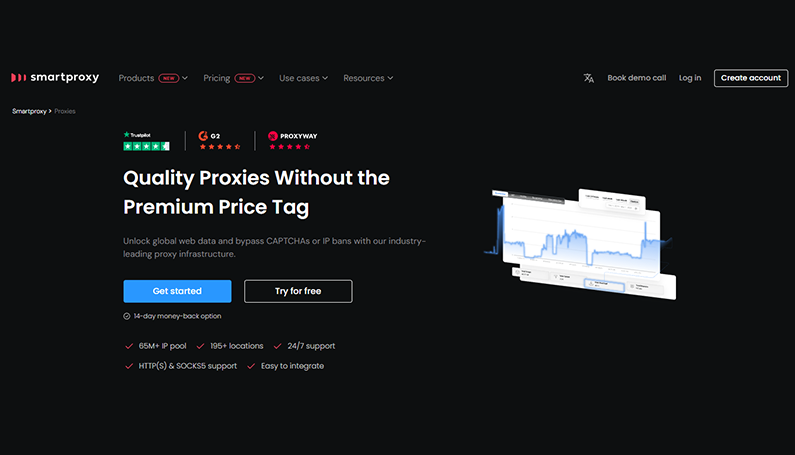
Profissionais: Grande pool de IPs (mais de 40 milhões de IPs), opções de sessão de alta velocidade, rotativas e fixas, fácil integração com software popular, excelente suporte ao cliente.
Contras: Cobranças com base no uso da largura de banda, o que pode não ser ideal para usuários de volume muito alto.
Precificação:A partir de US$ 12,50 por GB, sem requisito mínimo de uso. Planos de preços flexíveis com base no uso de dados.
Tipos suportados:HTTP, HTTPS, SOCKS5.
Tamanho do pool de IP: Mais40 milhões de IPs residenciais em todo o mundo.
Pontuação do Trustpilot:4.6/5.
Melhor para: Webraspagem, gerenciamento de mídia social, monitoramento de SEO e acesso a conteúdo bloqueado geograficamente.
2.SOAX
A SOAX oferece proxies residenciais confiáveis e de alta qualidade com modelos de preços flexíveis. Ele fornece aos usuários IPs limpos de uma ampla variedade de locais, garantindo alto anonimato e risco mínimo de bloqueio.
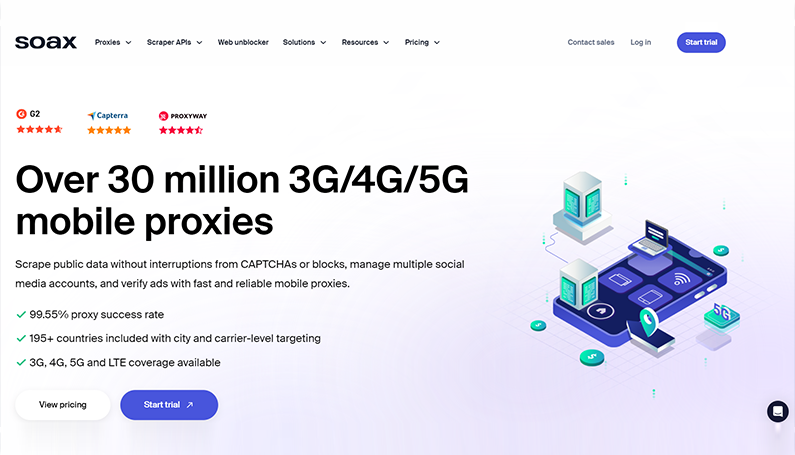
Profissionais: Planos de proxy personalizáveis, rotação de IP, pool de IP limpo e seguro, painel intuitivo, segmentação detalhada por localização.
Contras: Custo por GB ligeiramente mais alto em comparação com alguns concorrentes; Sem opções ilimitadas de largura de banda.
Precificação:A partir de US$ 99/mês para 8 GB, com opções flexíveis para expansão.
Tipos suportados:HTTP, HTTPS, SOCKS5.
Tamanho do pool de IP: Mais8,5 milhões de IPs residenciais em 120+ países.
Pontuação do Trustpilot:4.8/5.
Melhor para:Web scraping, mineração de dados, pesquisa de mercado e acesso a conteúdo localizado.
3.Proxy-Barato
O Proxy-Cheap oferece proxies residenciais acessíveis com um modelo pré-pago, ideal para usuários com orçamentos menores ou necessidades específicas e limitadas de proxy. Ele fornece opções de IP rotativo e fixo.
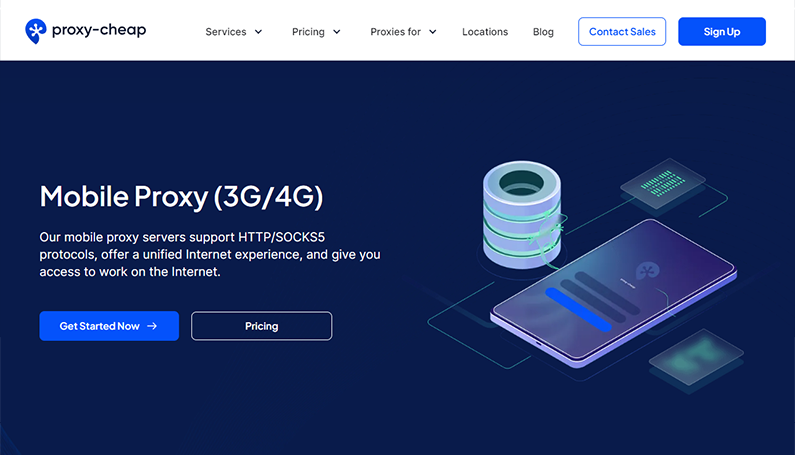
Profissionais: Preços competitivos, modelo flexível de pagamento conforme o uso, sem compromisso mínimo, grande pool de IP, fácil de usar.
Contras: O suporte ao cliente é limitado em comparação com provedores maiores; Alguns usuários relatam tempo de inatividade ocasional.
Precificação:A partir de US$ 5 por GB para proxies residenciais sem pedido mínimo.
Tipos suportados:HTTP, HTTPS.
Tamanho do pool de IP: Mais7 milhões de IPs residenciais.
Pontuação do Trustpilot:4.4/5.
Melhor para: Pequena escalaweb scraping, automação de mídia social e usuários com orçamento apertado.
4.IPRoyal
O IPRoyal é uma opção econômica para proxies residenciais, oferecendo serviços confiáveis com uma ampla variedade de endereços IP. Ele fornece proxies estáticos e rotativos, tornando-o adequado para várias tarefas, como web scraping, monitoramento de SEO e localização de conteúdo.
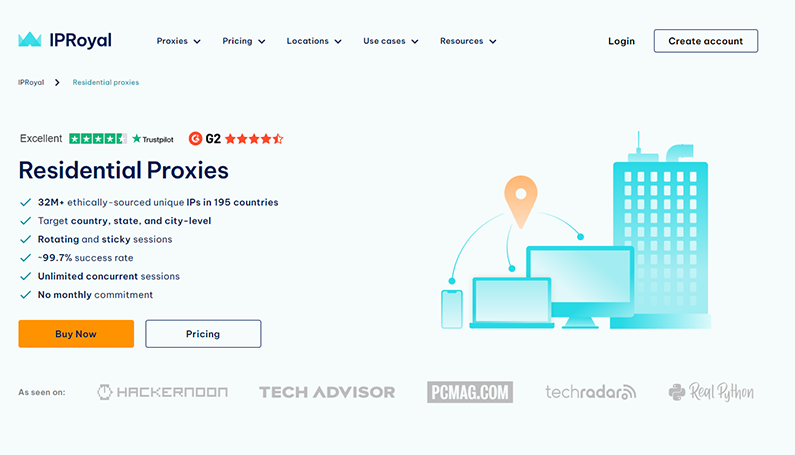
Profissionais: Preços acessíveis, sem requisitos mínimos de tráfego, opções de IP estático e rotativo, diversos pools de IP, bom suporte ao cliente.
Contras: O painel pode ser um pouco menos intuitivo em comparação com outros provedores; Recursos avançados limitados.
Precificação:A partir de US$ 7 por GB com um modelo pré-pago.
Tipos suportados:HTTP, HTTPS, SOCKS5.
Tamanho do pool de IP: Mais2 milhões de IPs residenciais.
Pontuação do Trustpilot:4.7/5.
Melhor para: Webraspagem, monitoramento de SEO e usuários que procuram uma opção econômica com um pool de IP diversificado.
5.Proxies de tempestade
O Storm Proxies oferece proxies residenciais acessíveis com fácil configuração e uso. Eles são conhecidos por seu desempenho confiável e modelo de preços simples, tornando-os uma escolha popular entre pequenas empresas e usuários individuais.
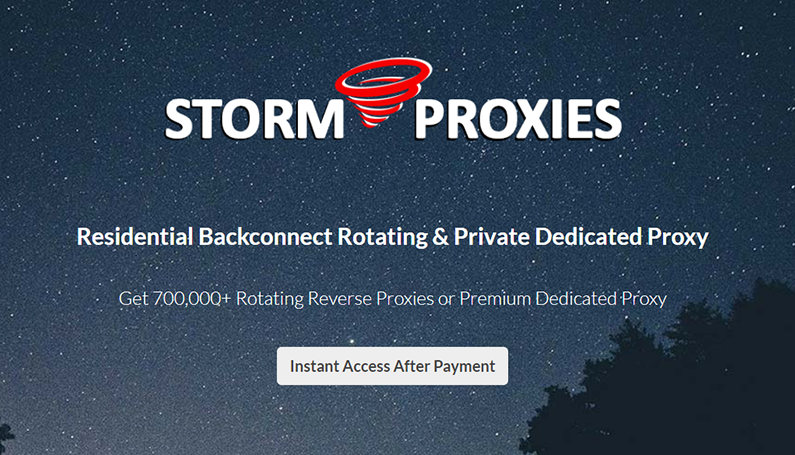
Profissionais: Opções de baixo custo, largura de banda ilimitada, preços simples, proxies rotativos, adequados para iniciantes.
Contras: Pool de IPs menor em comparação com provedores maiores, segmentação por local limitada e suporte básico ao cliente.
Precificação:A partir de US$ 50/mês para 5 portas com largura de banda ilimitada.
Tipos suportados:HTTP, HTTPS.
Tamanho do pool de IP: Mais70.000 IPs residenciais.
Pontuação do Trustpilot:4.1/5.
Melhor para: Web scraping de nível básico, gerenciamento de mídia social e tarefas online de pequena escala.
Esses cinco provedores oferecem uma variedade de proxies residenciais acessíveis e confiáveis, adequados para diferentes necessidades, desde projetos de pequena escala até tarefas maiores e mais exigentes. Dependendo do seu orçamento, recursos desejados e casos de uso específicos, você pode escolher aquele que melhor se adapta às suas necessidades.
Perguntas frequentes sobre proxies residenciais
1.Os proxies são ilegais?
Usar um servidor proxy não é ilegal por si só. No entanto, a legalidade do uso de procurações depende da finalidade e da jurisdição. Em alguns países, o uso de proxies para contornar a censura na Internet, acessar sites restritos ou se envolver em atividades ilegais é proibido por lei. É importante entender os regulamentos locais e usar proxies com responsabilidade para evitar problemas legais.
2.Um proxy é mais barato que uma VPN?
Os proxies geralmente são mais baratos que as VPNs, especialmente se você optar por serviços básicos de proxy que não fornecem criptografia ou recursos adicionais. Proxies gratuitos estão amplamente disponíveis, mas vêm com limitações em termos de segurança e confiabilidade. As VPNs, por outro lado, geralmente fornecem recursos de segurança, criptografia e privacidade mais altos, o que pode torná-las mais caras. No entanto, existem opções de VPN acessíveis disponíveis e algumas até oferecem versões gratuitas com recursos limitados. A escolha entre proxies e VPNs depende das necessidades específicas de privacidade, segurança e orçamento.
3.Proxies residenciais podem ser detectados?
Embora os proxies residenciais sejam mais difíceis de detectar do que os proxies de datacenter, eles não são completamente indetectáveis. Sistemas avançados anti-bot e de segurança cibernética podem identificar padrões suspeitos que sugerem o uso de proxies, como solicitações de alta frequência ou rotação de endereço IP. Alguns sites usam uma combinação de análise de reputação de IP, impressão digital do navegador e análise comportamental para detectar o uso potencial de proxy. No entanto, provedores de proxy residenciais respeitáveis geralmente usam técnicas avançadas, como rotação de IP e pools de IP limpos, para minimizar os riscos de detecção.
Ferramentas Gratuitas
Cookie Plugin
Gerador de UA
Gerador de Endereço MAC
Gerador de Endereço IP
Lista de Endereços IP
Gerador de Código 2FA
Relógio Mundial
Verificação de Anonimato
Verificador de Proxy
Verificador de Anúncios FB
Coleta Web com IA
Ferramentas SMM Grátis
Verificador de Shadowban do Twitter
Verificador de Nomes do Instagram








